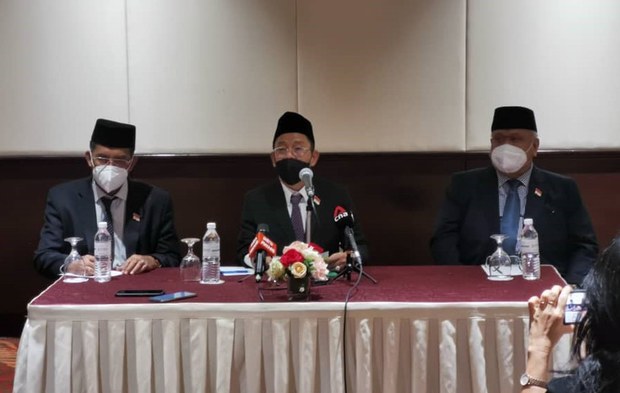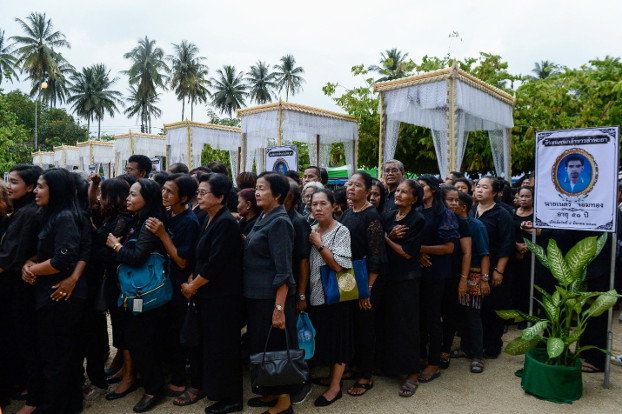Malaysia Hands Over 3 Rebel Suspects to Thailand
2022.01.13
Kuala Lumpur and Pattani, Thailand
 Anas Abdulrahman, who heads the negotiating team representing BRN rebels in Malaysia-brokered peace talks with Thailand, joins fellow delegates Che Muda (left) and Mohamad Shamsul (right) during a press conference near Kuala Lumpur, Jan. 13, 2022.
Anas Abdulrahman, who heads the negotiating team representing BRN rebels in Malaysia-brokered peace talks with Thailand, joins fellow delegates Che Muda (left) and Mohamad Shamsul (right) during a press conference near Kuala Lumpur, Jan. 13, 2022.
Updated at 5:20 p.m. ET on 2022-01-13
Malaysia handed three suspected insurgents to Thailand this week, as Thai and rebel negotiators wrapped up their first in-person peace talks in nearly two years, officials in Thailand’s troubled Deep South said Thursday.
The handover was the first official transfer in about 25 years of prisoners associated with the separatist insurgency in Thailand’s southern border region, a military source indicated. The Malay-speaking insurgents have long been known to seek haven across the border.
“Authorities took custody of three suspected insurgents handed over from Malaysia on Wednesday,” Thailand’s Internal Security Operations Command (ISOC) said Thursday.
“The insurgents escaped after committing crimes in the Deep South and went into hiding in Malaysia, but were captured by Malaysia’s 6th Infantry Division at illicit routes near Durian Burung, Kedah State, on Dec. 25, 2021,” ISOC said in a statement.
The transfer at the Sadao border crossing in southern Songkhla province, on the Thai-Malaysia frontier, took place on day two of Malaysia-brokered talks between representatives of the Thai government and the Barisan Revolusi Nasional (BRN) rebel group at a hotel near Kuala Lumpur.
The three suspects had criminal records, Thai authorities said, describing them as members of RKK (Runda Kumpulan Kecil), a combat unit of BRN. They have been taken to a regional police office for further investigation, officials said.
On Thursday, people on both sides of the border insisted that the handover was not related to the peace talks.
“This issue is not linked to last night's peace talks,” said a Malaysian security source who spoke on condition of anonymity.
“We don’t have any indication if the handover of the three was linked to the peace talks, or that the trio was opposed to the talks,” said Artef Sohko, president of The Patani, a civil society group based in Southern Thailand.
It is rare for Malaysia to extradite Deep South insurgents, said a Thai military source who requested anonymity because he was not authorized to speak to reporters.
The last time Malaysia handed over suspected insurgents – three key leaders of the PULO rebel group – was in 1997, according to the source.

Outcome of talks
During their talks the two negotiating teams agreed to form a “joint working group” to discuss a peaceful and inclusive political solution to the decades-old insurgency, according to the BRN.
“Patani has always supported the peace negotiation process with the hope that peace will return to the land of Patani,” Anas Abdulrahman, also known as Hipni Mareh, who led the BRN delegation, told a news conference near Kuala Lumpur on Thursday.
The BRN, a highly secretive organization, is the largest of armed groups waging a decades-old insurgency in the mainly Muslim and Malay-speaking Thai Deep South, and many BRN members and sympathizers are believed to be living on the Malaysian side of the border.
The two parties “agreed to form a Joint Working Group between BRN and the Thai government,” Abdulrahman told reporters.
“We have yet to decide on when it will be the set up… Hopefully, we have a working group before our next meeting this year,” he said, adding that both parties had agreed to send representatives.
The Thai government’s Peace Dialogue Panel said the two sides proposed the establishment of a Joint Working Group, without explicitly saying they agreed to it.
“The two sides proposed the establishment of … joint working groups which would support the peace dialogue process and allow the two sides to have a meaningful and flexible discussion with a tangible outcome,” the Thai panel said in a statement Thursday.
Both Abdulrahman and the Thai panel said the two sides discussed reducing violence, public consultations, and political solutions.
‘If we are attacked, we will defend ourselves’
The armed separatist movement against Buddhist-majority Thailand began in the 1960s. The movement’s primary demand has been independence for the people of Patani, the name given to the southern border region by BRN and other separatist groups.
Since the insurgency reignited in January 2004, more than 7,000 people have been killed and 13,500 injured in violence across the region, according to Deep South Watch, a local think-tank.
Abdulrahman claimed the violence had decreased since the BRN announced a unilateral ceasefire due to the COVID-19 pandemic in April 2020. The global outbreak of the coronavirus disease forced peace talks that began in person in Kuala Lumpur to go online.
Despite Abdulrahman’s assertion, Thai security services in the Deep South have blamed BRN for carrying on with attacks in the region, including violent incidents in the weeks leading up to the resumption of in-person peace talks.
“[I]f we are attacked, we will defend ourselves,” Abdulrahman said Thursday.
“BRN hopes that this peace talk will continue and will bring eternal and dignified peace to all people of Malay Patani,” he said.
The two sides also agreed to discuss governance, education, recognition of the Malay Patani identity, and the economic system in the south, the BRN chief negotiator said.
He added that two international experts monitored this week’s meetings, which were facilitated by former police chief Abdul Rahim Noor on behalf of Malaysia’s government.

Political experts hailed the Kuala Lumpur meetings as a move in the right direction.
This “is a significant milestone as it sets the stage for the discussion on three main issues: reduction of violence, public consultation, and political solutions,” said Rungrawee Chalermsripinyorat, a Deep South researcher and lecturer at the Prince of Songkla University.
The peace talks, she said, were “gradually moving from the confidence-building phase to the discussion on substantive matters.”
Peace talks are a lengthy process that require patience, she said.
“One good thing is that as long as the peace dialogue is continuing in a meaningful way, it should help contain the violence on the ground, while the negotiated agreement is yet to be found,” she told BenarNews on Thursday.







